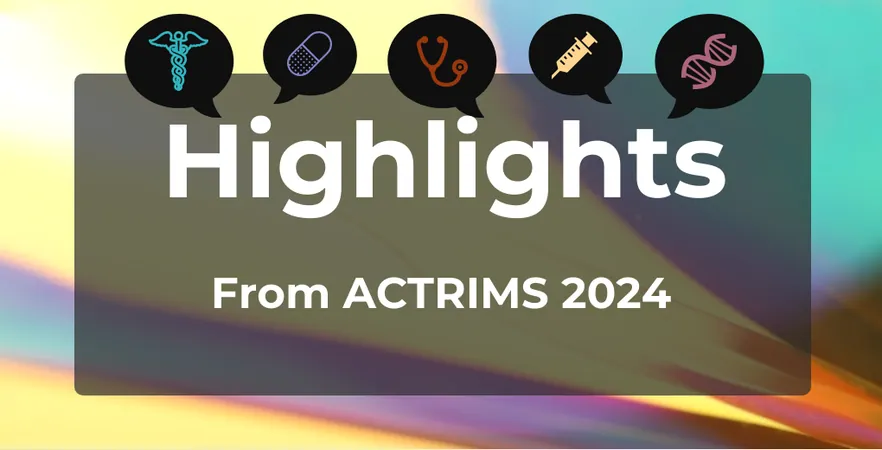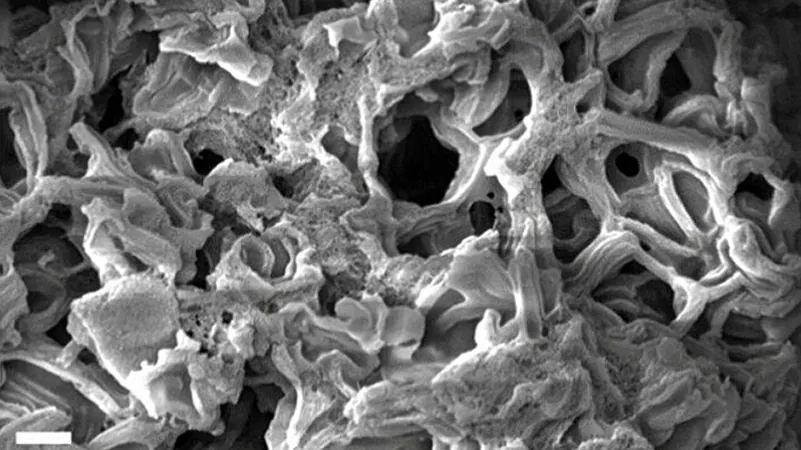
Major Breakthroughs at ACTRIMS 2024: What You Missed!
2024-12-12
Author: Olivia
The Americas Committee for Treatment and Research in Multiple Sclerosis (ACTRIMS) 2024 conference unveiled groundbreaking developments in multiple sclerosis (MS) research, bringing hope to patients and healthcare professionals alike. From advanced imaging techniques to the pivotal role of artificial intelligence, here’s a rundown of the most exciting highlights from this year’s event.
5. New Insights into MS Progression: A Game-Changer!
Notable presentations by Dr. Christian Cordano from UCSF and PhD candidate Ateyeh Soroush revealed essential markers influencing MS progression. Dr. Cordano discussed two trials that identified reduced inner plexiform layer (IPL) thickness in progressive MS patients, showcasing a startling link between synaptic injury and disease progression. Soroush elaborated on how nearly 45% of MS patients experience hypoxia, leading to cognitive decline and greater disease severity—key factors that could redefine treatment methodologies in the near future.
4. AI: The Future of MS Diagnostics and Treatment!
Artificial Intelligence is making waves in the MS research community! With its impressive ability to predict Expanded Disability Status Scale (EDSS) scores and enhance MRI imaging, AI is paving the way for more personalized patient care. One striking finding indicated that AI can identify MS lesions with up to 80% accuracy, signaling a dramatic shift in early diagnostics and treatment strategies that could save lives.
3. Cutting-Edge Imaging and 3D Modeling in MS Research
Technological growth was a focal point at this year's conference, especially in imaging and 3D modeling. Dr. Niels Bergsland from the University of Buffalo spotlighted the choroid plexus (CP), discovering that CP inflammation correlates with MS progression. Meanwhile, Dr. Krystyn Van Vliet’s team at Cornell University introduced revolutionary 3D printing techniques to fabricate synthetic axons that mimic human structures. This advancement could transform research on drug efficacy, lesion environments, and oligodendrocyte interactions.
2. Young Investigators Innovate: Exploring Aerobic Glycolysis and Cognitive Impairment
The second day showcased promising young researchers who tackled the complex world of metabolic processes in MS. Bradley Judge from Washington University highlighted aerobic glycolysis (AG) abnormalities as potential early indicators of MS. Hannah Schwartz emphasized the critical relationship between paramagnetic rim lesions (PRLs) and cognitive performance, driving home the importance of considering PRLs in personalized treatment plans.
1. Dr. Ari Green on Remyelination: Challenges and Future Prospects
In a riveting interview, Dr. Ari Green, a prominent figure in neuroimmunology at UCSF, discussed the hopeful prospects of remyelination for MS patients, emphasizing its potential to restore neuronal function and protect axons. However, he candidly acknowledged the significant hurdles faced in conducting successful remyelination trials, including drug validation and safety regulations. Dr. Green called for increased investment and innovation in this field to unlock the full potential of remyelination therapies.
Conclusion: A New Era for MS Research!
The ACTRIMS 2024 conference has set the stage for a transformative future in multiple sclerosis treatment and research. With breakthroughs that promise enhanced diagnostics, better treatment options, and a deeper understanding of the disease, the MS community is poised for incredible advancements. Stay tuned for more updates as these promising projects unfold!









 Brasil (PT)
Brasil (PT)
 Canada (EN)
Canada (EN)
 Chile (ES)
Chile (ES)
 España (ES)
España (ES)
 France (FR)
France (FR)
 Hong Kong (EN)
Hong Kong (EN)
 Italia (IT)
Italia (IT)
 日本 (JA)
日本 (JA)
 Magyarország (HU)
Magyarország (HU)
 Norge (NO)
Norge (NO)
 Polska (PL)
Polska (PL)
 Schweiz (DE)
Schweiz (DE)
 Singapore (EN)
Singapore (EN)
 Sverige (SV)
Sverige (SV)
 Suomi (FI)
Suomi (FI)
 Türkiye (TR)
Türkiye (TR)